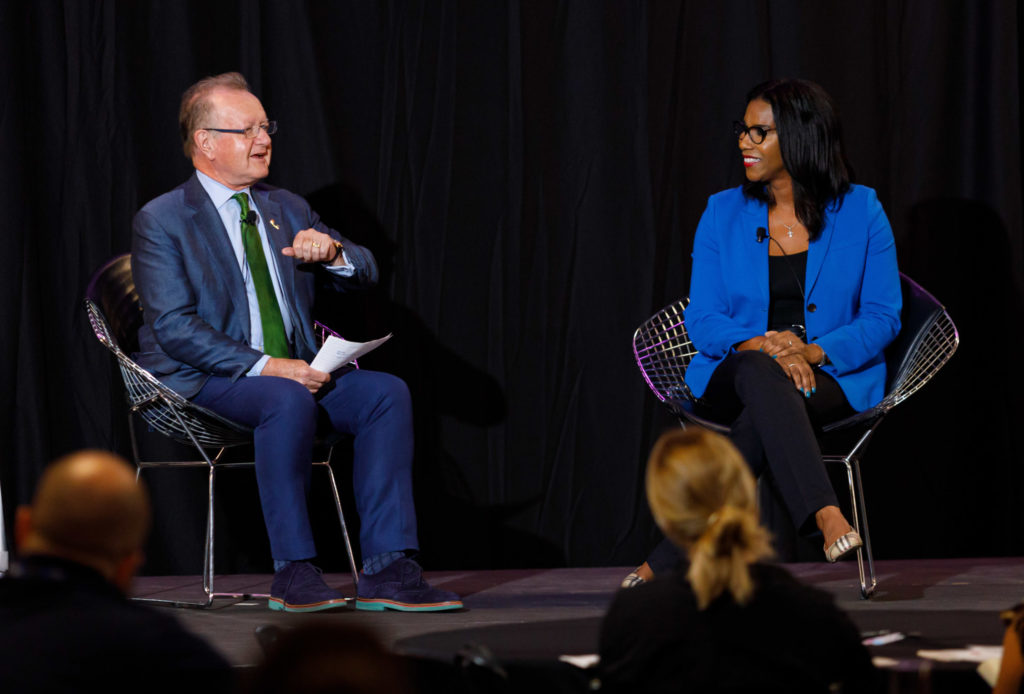Leading a Global Workforce in the Post-Pandemic Era


“I think now, leaders are really the stewards, shepherds, ambassadors of that day-to-day experience with employees. Leaders really need to be more connected and tuned in to what’s going on with their teams,” said Ashaki Rucker, NBCUniversal’s senior vice president of HR for Telemundo and Latin America.
In this post-pandemic world of 2023, Rucker is leveraging her extensive experience to lead a geographically dispersed and culturally diverse team of professionals across the U.S. and Latin America, including places as far-flung as Mexico, Brazil, Argentina, and Colombia. At From Day One’s conference in Miami, she spoke in a fireside chat with John Quelch, dean the Miami Herbert Business School at the University of Miami, about the role that HR leaders play in this new landscape.
Leadership, especially focusing on the human aspect as one does in HR, means having elevated levels of emotional intelligence and even “being okay to be vulnerable with your team, and leading more so from a heart-centered place” because “through the pandemic, we’ve all seen into each other’s homes, we’ve all experienced many of the same things, personal losses, health scares,” said Rucker.
Today, retaining the best talent requires flexibility to meet employees where they are, perhaps quite literally, and for many, the work-from-home option is here to stay. “For the traditional leaders, the reality is that the context is changed,” says Rucker. Paradoxically, connecting with your employees on that closer level is certainly becoming harder in an environment of remote work. A good middle ground is a hybrid model, she says, which is how Telemundo is proceeding.
“For the most part, we’ve tried to blend the amount of time you work remotely, as well as the amount of time that you spend in the office for that very reason,” because, in some ways, it still is true that nothing trumps the creativity and collaboration of the in-person dynamic. “Anything that we were capable of doing in the office can be done remotely, it’s just not as deep of a connection,” Rucker said, mentioning tools like water-cooler mentoring, which might happen on a video call instead.

To ensure teams remain successful wherever they are in this hybrid model, “I think one of the things we’ve grappled with is, When you’re in the office, how are you actually spending your time? Because if you’re on the phone with people who are working remote, and you’re just sitting in your office or at your desk with a computer, that’s clearly not valuable time.” Taking advantage of the benefits of in-office work actually requires some work. If you’re not interacting with coworkers in person, you’re not doing it. To tackle this, Rucker and other leaders are exploring which kinds of work make sense to be done remotely and which kinds of work will be most successful when their teams are in the office.
Personally, however, Rucker is a fan of the office. “I’ve been doing HR For almost 30 years now, and I will say that being back in the office for me as well has been quite beneficial in terms of just the efficiencies that you grab,” she said.
A few points are particularly important in the new, global, post-Covid work environment of 2023, Rucker says. Having fluid and agile structures is important because “traditional, rigid organizational structures are not going to drive us sustainably into the future.” These new structures will more easily have “the ability to match skills, talents, and capabilities to meaningful work.” Instead of a top-down structure, “I really see the ability to bring the right talent forward at the right as the time most critical,” she said.
“I think certainly a focus on diversity, equity, and inclusion, is critical,” she said, if for no other reason than that “all the data shows that, you know, recruiting and retaining diverse talent actually shows up in your bottom line.” Diversity in the new environment has gone from something to strive for as a moral and ethical choice to simply a better way of doing business and a prudent financial decision.
Finally, “really driving creativity and innovation all day, every day,” is essential, but as essential is “creating safe spaces for people to fail too.” Rucker feels that many more executives claim they’re comfortable with creativity than are actually comfortable with failure as a necessary aspect of that creativity. She says it “becomes really challenging when a project or product doesn’t work. We have to actually still encourage our talent to continue trying and failing and building until we get it right.”
Sean McCaughan is freelance writer and design critic in Miami. He was the founding editor of Curbed Miami, which he helmed for four years. He has written for the New York Times, American Way magazine, Ocean Drive magazine, and many others.
The From Day One Newsletter is a monthly roundup of articles, features, and editorials on innovative ways for companies to forge stronger relationships with their employees, customers, and communities.